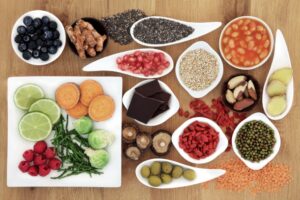It seems that every day a new superfood hits the news, with its disease-fighting properties and health benefits. But are such foods really better for you than others, or should you take them with a pinch of salt?
The problem with superfoods is that are marketed in such a way to make them appear miraculous. As reported by the UK’s National Health Service (NHS) in Miracle Foods: Myths and the Media, superfood claims include the ability to reverse diabetes, protect various body parts or even save your life.
Foods regarded as ‘superfoods’ are usually fruits and vegetables, as well as other unprocessed foods; nuts; grains; and seeds. This does make them healthier for you than processed or sugar-packed foods, just from a purely logical standpoint. The purer a food is, the more nutrients it will have, giving your body the vitamins it needs.
Of course, it’s a myth to think that just one superfood can tackle major diseases all on its own, detox your body of toxins or prevent blindness. However, incorporating a variety of healthy foods in your diet can make a difference in how healthy you are. Here is why superfoods can be good for you.
Superfoods: Can They Really Be That Good For You?

Nutrient Density
Fact: Some foods do have greater levels of nutrition than others. In a study published by Preventing Chronic Disease, associate professor of sociology at William Paterson University Jennifer Di Noia studied 17 nutrients that are regarded by revered organizations (such as the United Nations) to be an important part of a healthy diet.
The foods were then ranked according to nutrient density – that is, foods which offer you the most nutrients with fewest calories. Some of the foods regarded as the most nutrient-dense in the study were spinach, kale, pumpkin, cauliflower, watercress, leaf lettuce and red peppers.
Antioxidant-Enriched
Our bodies need antioxidants to fight off free radicals. These free radicals are dangerous in the body as they can contribute to chronic illnesses, such as vision loss and heart disease. Although we cannot rely on antioxidant-rich foods to prevent such illnesses, they can form part of our defense against them.
As mentioned in The American Journal for Clinical Nutrition, most plant foods contain antioxidants. Just by eating fruits, vegetables, nuts and whole grains, you can improve your protection against illness and other age-related health issues that can occur.
A study by the Human Nutrition Research Center on Aging (Tufts University) looked at various fruits and vegetables to discover their antioxidant prowess. These are some that were said to contain the most antioxidants:
Blueberries
They are often lauded when it comes to the superfoods stakes, and with good reason: blueberries contain a greater amount of antioxidants than 40 other fruits and vegetables.
Kale
Regarded as the new spinach, kale contains many antioxidants and vitamins, such as lutein and beta-carotene. Your body converts beta-carotene into Vitamin A, which is important for protection against infections, maintaining skin health, as well as keeping linings in the body (such as in the nose) healthy. Other good sources of Vitamin A include yogurt and eggs.
Fatty Acids
Having enough omega-3s in your diet is not really about superfoods, but general health: these fatty acids are components of cell membranes. They enable substances in the body to keep blood pressure at healthy levels as well as regulate the body’s inflammatory response.
Many superfoods contain healthy omega-3s. Some of the top omega-3 foods include flaxseed oil, salmon, chia seeds, and nuts such as walnuts.
Omega-6s (otherwise known as linoleic acid) are equally important for healthy bodily functions. They can be found in many food sources, such as pumpkin seeds, olive oil, coconut oil and avocado.

Superfoods should really be viewed as foods that can contribute to a healthy lifestyle. No big claims or miracle cures, just healthy daily eating habits that can keep your body filled with the nutrients it needs to look and feel good!
